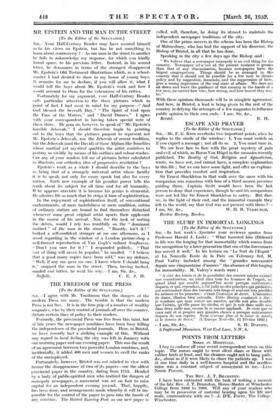THE FREEDOM OF THE PRESS [To the Editor of the
SPECTATOR.]
agree with Mr. Tomlinson that the dangers of the modern Press are many. The trouble is that the modern Press is not free. It is in the firm grip of a number of wealthy magnates, who by their control of journals all over the country, dictate certain lines of policy to their readers.
Formerly,- the provincial Press was free from this taint, but of late years the newspaper combines have been busy killing the independence of the provincial journals. Here, in Bristol, we have recently had a striking example of this. Without any regard to local feeling the city was left in January with one morning paper and one evening paper. This- was the result of an agreement between two powerful London combines, and, incidentally, it added 400 men and women to swell the ranks of the unemployed. - Fortunately, however, Bristol was not minded to view with favour the disappearance of two of its papers--nne the oldest provincial paper in the country, dating from 1713. Headed by a body of public-spirited men who realized the dangers of monopoly newspapers, a movement was set on foot to raise capital for an independent evening journal. That, happily, has been done, and arrangements made whereby it will be im- possible for the control of the paper to pass into the hands of any combine. The Bristol Evening PoSt, as our new-. paper is
called, will, therefore, be. doing its utmost to maintain the independent newspaper traditions of the city.
One of the prime movers in the scheme has been the Bishop of Malmesbury, who has had the support of his diocesan, the Bishop of Bristol, in all that he has done.
Speaking in the city a few days ago the.Bishop said : " We believe that a newspaper Monopoly is an evil thing for the country. Newspiper inf u -nee at the present moment is greater than that of any denomination, because newspapers have the lirgest congregations. Things shonld be so arranged in this country that it should not be possible for a few men to dictate policy and by suggestion, innuendo, and the suppression of facts, give a wrong impression of the real state of affairs. We dare not sit down and leave the guidance of this country in the hands of a few men, no matter how wise, how strong, and hew honest they may
With these opinions thousands will be in complete agreement. And here, in Bristol, a lead is being given to the rest of the country in defying the attempts of a few magnates to influence public opinion to their own ends.---I am, Sir, &c.,


































 Previous page
Previous page